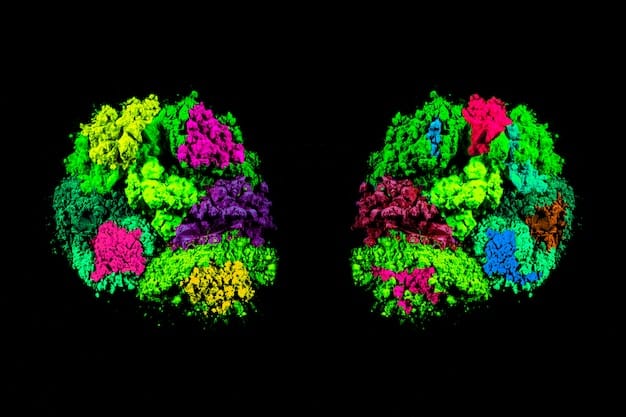The Power of Presence: Mindfulness Meditation for Daily Transformation

The Power of Presence through mindfulness meditation can significantly transform daily life by enhancing focus, reducing stress, and fostering a deeper connection with oneself and the surrounding environment.
Discover the power of presence: how mindfulness meditation can transform your daily life. By cultivating awareness, you can learn to navigate challenges with greater ease and find moments of peace amidst the chaos.
Understanding the Essence of Mindfulness Meditation
Mindfulness meditation is more than just a relaxation technique; it’s a practice that involves focusing your attention on the present moment without judgment. It’s about observing your thoughts and feelings as they arise and pass, without getting carried away by them.
By consistently practicing mindfulness meditation, you can develop a heightened sense of awareness, which allows you to respond more thoughtfully to situations rather than reacting impulsively. This heightened awareness can lead to improved emotional regulation and a greater sense of inner peace.
The Roots of Mindfulness
Mindfulness has roots in Buddhist traditions, but it is now practiced worldwide across many cultures and belief systems. The core idea is to cultivate a non-judgmental awareness of the present moment, which can be done through various techniques like focused breathing, body scan meditations, and mindful movement.
- Historical Context: Tracing mindfulness back to ancient Buddhist practices.
- Modern Adaptations: How mindfulness has been integrated into secular practices and therapies.
- Key Philosophers: Highlighting influential figures who have contributed to the understanding of mindfulness.
Mindfulness isn’t about emptying your mind; it’s about training your mind to observe and accept your thoughts without getting entangled in them.
The Science Behind Mindfulness Meditation
The benefits of mindfulness meditation aren’t just anecdotal; numerous scientific studies have demonstrated its positive impact on both mental and physical health. Research has shown that regular mindfulness practice can alter brain structure and function, leading to improvements in attention, emotional regulation, and overall well-being.
Neuroimaging studies have revealed that mindfulness meditation can increase gray matter density in areas of the brain associated with learning, memory, and emotional regulation. It also reduces activity in the amygdala, the brain’s fear center, which can lead to reduced stress and anxiety.

Benefits Supported by Research
Scientists have explored the manifold effects of mindfulness, providing empirical evidence for its transformative potential.
- Stress Reduction: Documented decreases in cortisol levels and perceived stress.
- Improved Focus: Enhanced attention span and concentration abilities.
- Emotional Regulation: Better management of emotions and reduced reactivity.
By understanding the science behind mindfulness, you can appreciate its potential as a powerful tool for enhancing your overall health and well-being.
Integrating Mindfulness into Your Daily Routine
Incorporating mindfulness into your daily life doesn’t require hours of meditation each day. Small moments of mindfulness can make a big difference. Start by finding simple ways to bring more awareness to your everyday activities.
Whether it’s paying attention to the sensation of your feet on the ground as you walk, or noticing the flavors and textures of your food as you eat, mindfulness can be effortlessly woven into your routine. The key is to approach each moment with curiosity and openness.
Simple Mindfulness Practices
Mindfulness can be infused into daily activities, transforming mundane moments into opportunities for presence.
- Mindful Breathing: Taking a few deep breaths and focusing on the sensation of the breath.
- Body Scan Meditation: Paying attention to different parts of your body, noticing any sensations.
- Mindful Eating: Engaging all your senses while eating, noticing the flavors, textures, and aromas.
Adopting just a few minutes of mindfulness each day can enhance your sense of presence and improve your overall quality of life.
Overcoming Obstacles in Mindfulness Practice
When starting a mindfulness practice, it’s common to encounter obstacles such as a wandering mind, restlessness, or feelings of impatience. These are natural parts of the process, and it’s important to approach them with kindness and acceptance.
Instead of getting frustrated with yourself when your mind wanders, gently redirect your attention back to your chosen focus, whether it’s your breath, a body sensation, or an external object. The act of gently redirecting your attention is itself a form of mindfulness practice.
Common Challenges and Solutions
Navigating the initial hurdles can be daunting, but understanding these challenges makes them easier to overcome.
Restlessness: Physical and mental strategies to ease discomfort.
- Wandering Mind: Techniques for gentle redirection and focus.
- Impatience: Cultivating patience and accepting the present moment.
Learning to navigate these obstacles with self-compassion and patience is crucial for developing a sustainable mindfulness practice.
Mindfulness Meditation Techniques for Beginners
For beginners looking to start practicing mindfulness meditation, there are several techniques to explore. Focused attention meditation, which involves concentrating on a specific object or sensation like the breath, is a great starting point.
Another effective technique is body scan meditation, which involves systematically bringing awareness to different parts of your body, noticing any sensations without judgment. Both of these practices can help you develop a stronger connection to the present moment.

Getting Started with Guided Meditations
These resources provide structured approaches to beginning your mindfulness journey.
- Choosing the Right Meditation: Understanding the different types of guided meditations.
- Creating a Comfortable Space: Setting up a peaceful environment for practice.
- Consistency is Key: The importance of regular, even short, meditation sessions.
Beginning with guided meditations can provide a structured approach to learning and practicing mindfulness effectively.
The Transformative Impact on Mental Well-Being
Mindfulness meditation can have a profound impact on your mental well-being by reducing symptoms of anxiety and depression, improving emotional regulation, and cultivating a greater sense of self-compassion. By learning to observe your thoughts and feelings without judgment, you can develop a more balanced and accepting relationship with yourself.
Regular mindfulness practice can also help you develop resilience in the face of stress and adversity. By cultivating a sense of presence, you can learn to respond to challenges with greater clarity and equanimity, rather than reacting impulsively.
Real-Life Applications and Benefits
Exploring how mindfulness transforms ordinary lives—from emotional resilience to better relationships.
- Improved Relationships: Enhancing empathy and communication skills through mindfulness.
- Increased Resilience: Developing mental fortitude to handle life’s challenges.
- Enhanced Self-Awareness: Gaining deeper insight into personal thoughts and emotions.
Through consistent practice, mindfulness meditation can lead to significant improvements in mental health and overall quality of life.
| Key Point | Brief Description |
|---|---|
| 🧘♀️ Mindfulness Definition | Focusing on the present moment without judgment. |
| 🧠 Scientific Benefits | Reduces stress, improves focus, and regulates emotions. |
| 📅 Daily Integration | Weave mindfulness into daily activities like breathing and eating. |
| 💖 Mental Well-Being | Enhances self-compassion and emotional resilience. |
Frequently Asked Questions
Mindfulness meditation involves focusing on the present moment without judgment, observing thoughts and feelings as they arise and pass.
Begin with simple techniques like focused breathing or body scan meditation. Guided meditations can also be a great starting point.
Benefits include reduced stress, improved focus, enhanced emotional regulation, and increased self-awareness and compassion.
Even a few minutes of daily practice can make a difference. Consistency is key, so try to incorporate it into your daily routine.
It’s normal for your mind to wander. Gently redirect your attention back to your chosen focus without judgment or frustration.
Conclusion
Embracing the power of presence through mindfulness meditation offers a pathway to transform your daily life. By cultivating awareness, you can enhance your mental well-being, improve your relationships, and navigate life’s challenges with greater ease and resilience. Start your mindfulness journey today and experience the profound benefits of living in the present moment.





